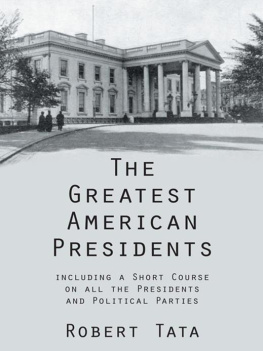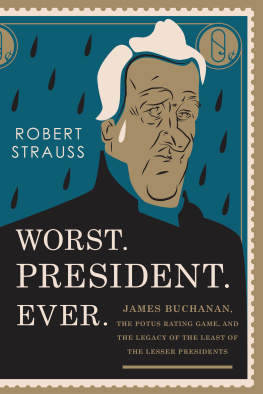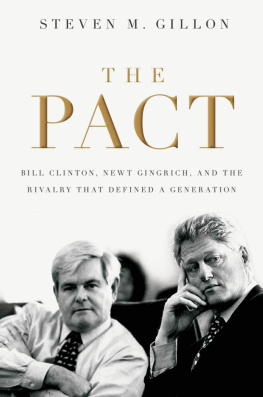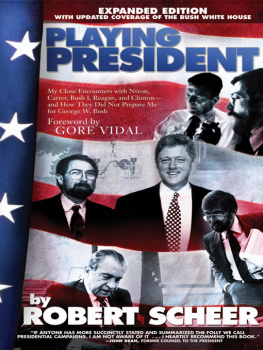About the Author
Robert P. Watson , PhD, has published three dozen books and roughly 150 scholarly articles, book chapters, and essays on topics in American politics and history. He has been interviewed by hundreds of news outlets in the United States and internationally; writes a Sunday column for the Sun-Sentinel newspaper; serves as the political analyst for WPTV 5 (NBC) in West Palm Beach, Florida; and blogs for media outlets. Watson has also served on the boards of many scholarly journals, academic associations, community organizations, and presidential foundations; coconvened seven national conferences on the American presidency; and received numerous awards for his service to the community and teaching excellence including Professor of the Year at both Florida Atlantic University and Lynn University. Robert resides in Boca Raton, Florida, with his wife Claudia and children Alessandro and Isabella, where he is professor and director of American studies at Lynn University.
Sources
CHAPTER 1
Most material in this chapter comes from the following sources: Richard Brookhiser, Rediscovering George Washington: Founding Father (New York: Free Press, 1996); Joseph J. Ellis, His Excellency: George Washington (New York: Vintage, 2005); James Thomas Flexner, Washington: The Indispensable Man (Boston: Back Bay Books, 1994); and Richard Norton Smith, Patriarch: George Washington and the New American Nation (Boston: Houghton Mifflin, 1993).
Washingtons papers and letters have been edited and published, and many of the quotes about his relationship with the three women discussed in this chapter come from them. See William Abbot and Dorothy Twohig, eds., The Papers of George Washington (Charlottesville: University of Virginia Press, 1979), and Jared Sparks, ed., The Writings of George Washington: Being His Correspondence, Addresses, Messages, and Other Papers, Official and Private , 8 vol. (Charleston, SC: Nabu Press, 2008; reproduced from 1847, 1923, and other reprintings). The website at the Washington home, Mount Vernon, and the Mount Vernon Ladies Association also provides information on and easy access to some of Washingtons writings and was used in this chapter.
Less attention has been paid by scholars to George Washingtons youthful romances and love interests. Accounts remain, however, in Washingtons diaries. Most quotes from his early years in this chapter are from Dorothy Twohig, ed., George Washingtons Diaries: An Abridgement , 6 vols. (Charlottesville: University of Virginia Press, 1999).
The poem Washington penned for Frances Alexander is discussed in Douglas Southall Freemans George Washington: A Biography (New York: Scribners Sons, 19481957). See vol. 1, p. 260, for the poem. The poem and accompanying discussion are also available at http://american-poetry.suite101.com/article.cfm/two-poems-by-george-washington.
The claim that Washington had an affair with Polly Morris and the rumors about it are found in Nigel Cawthorne, Sex Lives of the Presidents: An Irreverent Expose of the Chief Executive from George Washington to the Present Day (1996; reprint, New York: St. Martins Press, 1998), p. 10. Cawthorne also discusses Washingtons clothing being stolen by two young girls on p. 7 of his book and the rumors of night walking at the slave quarters on p. 15. There is no evidence that Washington ever partook of this terrible practice that was common with other slave owners. The account of the French officer describing Washingtons interest in young women is found on p. 21 of Cawthorne.
The account of George and Martha Washington first meeting at the Chamber-layne estate is told in George Washington Parke Custis, Recollections and Private Memoirs of Washington (New York: Derby and Jackson, 1860), pp. 499501. G. W. P. Custis was Marthas grandson from her first marriage. He lived from 1781 to 1857, and the book was published posthumously and edited by his daughter, Mary Anna Custis Lee, wife of General Robert E. Lee of Confederate fame.
I used a few sources in describing the nature of the Washington marriage, including Elswythe Thane, Washingtons Lady (New York: Dodd, Mead, and Co., 1954). George Washingtons account ledger for 1758 is another helpful source on Washingtons marriage and was used in this chapter. In particular, it has information on his orders for clothing for the wedding. It is available at Mount Vernon. Washingtons letter ordering a coat and engagement ring from a London merchant is also reprinted in Abbot and Twohig, Papers , vol. 5, p. 112. The Custis Papers also provided me with information on the marriage and are both housed in the Virginia Historical Society in Richmond and reproduced in Freemans Washington ; vol. 2, pp. 299300.
I used Thomas S. Langston and Michael G. Sherman, George Washington (Washington, DC: CQ Press, 2003) for additional information on Martha Dandridge Custis Washingtons wealth and her marriage to Washington, pp. 2224.
George Washingtons letters to the London merchant and trader Robert Cary are discussed in Papers and are also available at the University of Virginia. See http://www.virginia.edu/gwpapers/documents/revolutionary/letters/index.html.
Sally Fairfaxs descendant who, based on family letters and lore, commented on her relationship with George Washington is Wilson Miles Cary. His book proved to be a valuable source for this chapter. See Wilson Miles Cary, Sally Cary: A Long Hidden Romance of Washingtons Life (New York: De Vine Press, 1916). The opening quotes used in the chapter are on p. 9 of Carys book.
One of the sources used to discuss the early criticisms of scholars who contemplated Washingtons relationship with Sally Fairfax is Nathaniel Wright Stevensons noted article The Romantics and George Washington. It was published in American Historical Review 39, no. 2 (January 1934): 274283. Stevenson was the scholar who dubbed his colleagues who expressed an interest in Sally Fairfax the romantics.
CHAPTER 2
Most material in this chapter comes from the following sources: Nigel Cawthorne, Sex Lives of the Presidents: An Irreverent Expose of the Chief Executive from George Washington to the Present Day (1996; reprint, New York: St. Martins Press, 1998); William Dudley, ed., Political Scandals: Opposing Viewpoints (Farmington Hills, MI: Greenhaven Press, 2001); Kim Long, ed., The Almanac of Political Corruption, Scandals and Dirty Politics (reprint, Delta, 2008); Nancy E. Marion, The Politics of Disgrace: The Role of Political Scandal in American Politics (Durham, NC: Carolina Academic Press, 2010); Hope Ridings Miller, Scandals in the Highest Office (New York: Random House, 1973); Russell Roberts, Presidents and Scandals (San Diego: Lucent Books, 2001); Shelley Ross, Fall from Grace (New York: Ballantine Books, 1988); and Paul Slansky, The Little Quiz Book of Big Political Sex Scandals (New York: Simon & Schuster, 2009). There is also a book on the topic that provides a good background on the nature and frequency of political scandals, but it is geared toward young adults and school students: Barbara Silberdick Feinberg, American Political Scandals: Past and Present (New York: Franklin Watts, 1992).
Information on Grants Credit Mobilier scandal comes from the Central Pacific Railroad Museum, which has primary source materials on the scandal at http://CPRR.org/Museum/Credit_mobilier.html. The congressional report on the scandal was published by the U.S. Government Printing Office and is available at http://www.corvalliscommunitypages.com/americas/us/usnotoregon/creditmobilierall.htm.
The main source used on Hardings Teapot Dome scandal is Laton McCartney, The Teapot Dome Scandal: How Big Oil Bought the Harding White House and Tried to Steal the Country (New York: Random House, 2009).
President Reagans quote about not remembering the details of the Iran-Contra scandal comes from a televised address to the nation from the White House on March 4, 1987, and is available at the Presidential Rhetoric Project at http://www.presidentialrhetoric.com/historicspeeches/reagan/irancontra.html.





